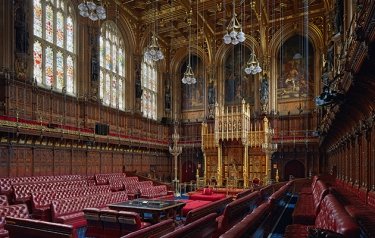Adieu, House of Lords!
Britain Sinking into the Sea, House of Lords, Labour Party
Another great traditional institution is destined to fall due to another Labour victory.
An edited version of remarks delivered by Andrew Roberts at the House of Lords on July 23, 2024.
My Lords, it would be churlish not to congratulate the Labour Party on its stunning victory on the fourth of July and unpatriotic not to wish the Government luck and a fair wind. Since the abolition of the hereditary element in this House was in their manifesto, and of course they have the political power to enact it, all I want to do today is speak as an historian about the effect of breaking this living link that we presently have with Britain’s past.
Burke tells us, “Society is indeed a contract . . . it becomes a partnership not only between those who are living, but between those who are living, those who are dead, and those who are to be born.” The hereditary element in this place represents—I hope hereditary Peers in this debate will not mind this characterization—the “dead” part of that contract, for they do not merely represent themselves here; they also represent their ancestors, whose often glorious deeds have made Britain the country that she is today.
When we see the noble Lord, Lord Ponsonby, for example, as well as the good-natured and highly intelligent fellow who sits on the Labour Front Bench, we also see the shade of his great-great-great-grandfather, Major General Sir Frederick Ponsonby, whose charge of the twelfth Light Dragoons helped save the Union Brigade at a critical moment of the Battle of Waterloo—which, of course, was won by the ancestor of another of our present-day Members of this House, the noble Duke, the Duke of Wellington. The noble Lord, Lord Cromwell, who is speaking in this debate, holds a title that, for all that it went into abeyance for four hundred years, was created in 1375, six hundred fifty years ago next year—nearly two-thirds of a millennium.
We are surrounded by ghosts in this Chamber, but they are the ghosts of the great. One of the speakers in this debate from the Liberal Benches will be the noble Viscount, Lord Thurso. At a crucial moment for the continued existence of this country, in May 1940, his grandfather, Sir Archibald Sinclair, put party differences to one side to make his old comrade from the trenches, Winston Churchill, Prime Minister. He was Secretary of State for Air during the Battle of Britain. Then, only three months after he left that vital post, his place was taken by Viscount Stansgate, a decorated RAF officer and, of course, the grandfather of our own noble Viscount, Lord Stansgate.
Some of the families represented in this House go back to the very founding of our country. The first Duke of Montrose—and we heard that moving statement from the eighth Duke—played a central part in the Act of Union that created the United Kingdom.
The greatness and the drama of our national past finds a living embodiment here in this Chamber in a way that does not exist in other Parliaments around the world. Once that link is broken, it cannot be reconstituted. To quote Burke again, “The age of chivalry is gone. That of sophisters, economists; and calculators has succeeded.” My Lords, I hope that, when the time comes to say farewell to the hereditary Peers, we will do so full of genuine gratitude for the centuries of service that they and their families have given this House and this country.
All of which proves that the Lords in 1911 should have listened to Lord Willoughby de Broke and called out the Household Cavalry to disperse the Commons when Asquith’s government undertook to ram through the Parliament Bill stripping the House of Lords of most of its power of veto.





